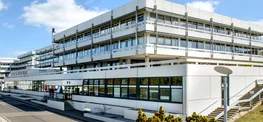The Max Planck Institutes for Biophysical Chemistry and Experimental Medicine in Göttingen are internationally leading research institutes of exceptional scientific breadth, which will merge in 2022 to become the largest institute of the Max Planck Society. The new institute will comprise more than 40 research groups and employ around 1,000 people from over 50 nations.
The emeritus group Genes and Behavior (Gregor Eichele) and the research group Quantitative and Computational Biology (Dr. Johannes Söding) are inviting applications for a
Student research Assistant (f/m/d)
Recent evidence has indicated that the phenomenon of diel vertical migration (DVM) is influenced by the molecular circadian clock. However, characterizations of the clock in organisms that undergo DVM are scant. Preliminary evidence indicates the existence of a circadian clock in two marine copepods that undergo DVM to different degrees--Acartia clausii and Acartia tonsa. We are interested in establishing a catalog of genes expressed in a circadian manner and/or under circadian control in these organisms using transcriptome analysis techniques. To this end we have sequenced a 48-hour time series RNA-seq data-set from A. clausii (with data from A. tonsa to follow). We seek an enthusiastic student to help carry this analysis forward. The candidate’s initial tasks will include assembling and annotation the transcriptomes, and identifying genes with circadian expression patterns. Comparative analyses based on this data will follow (also to be performed by the student).
The student research assistant position entails a workload of 40 hours/month. Payment will be € 12,68 per hour for students with a bachelor degree and € 10,91 per hour without a bachelor degree. The position is to be filled as soon as possible. The candidate must be enrolled in a bachelors or masters program at a university in Germany at the time of application.
The Max Planck Society is committed to increasing the number of individuals with disabilities in its workforce and therefore encourages applications from such qualified individuals. The Max Planck Society strives for gender and diversity equality. We welcome applications from all backgrounds.
Interested candidates are urged to submit a CV, degree certificate (if applicable), and enrollment certificate preferably via email as a single PDF file to vraghav@mpibpc.mpg.de
Max Planck Institute for Biophysical Chemistry
Research Group “Quantitative and Computational Biology”
Dr. Johannes Söding
Am Faßberg 11
37077 Göttingen
Germany
Information pursuant to Article 13 DS-GVO on the collection and processing of personal data during the application process can be found on our website below the respective job advertisement.



No comments:
Post a Comment